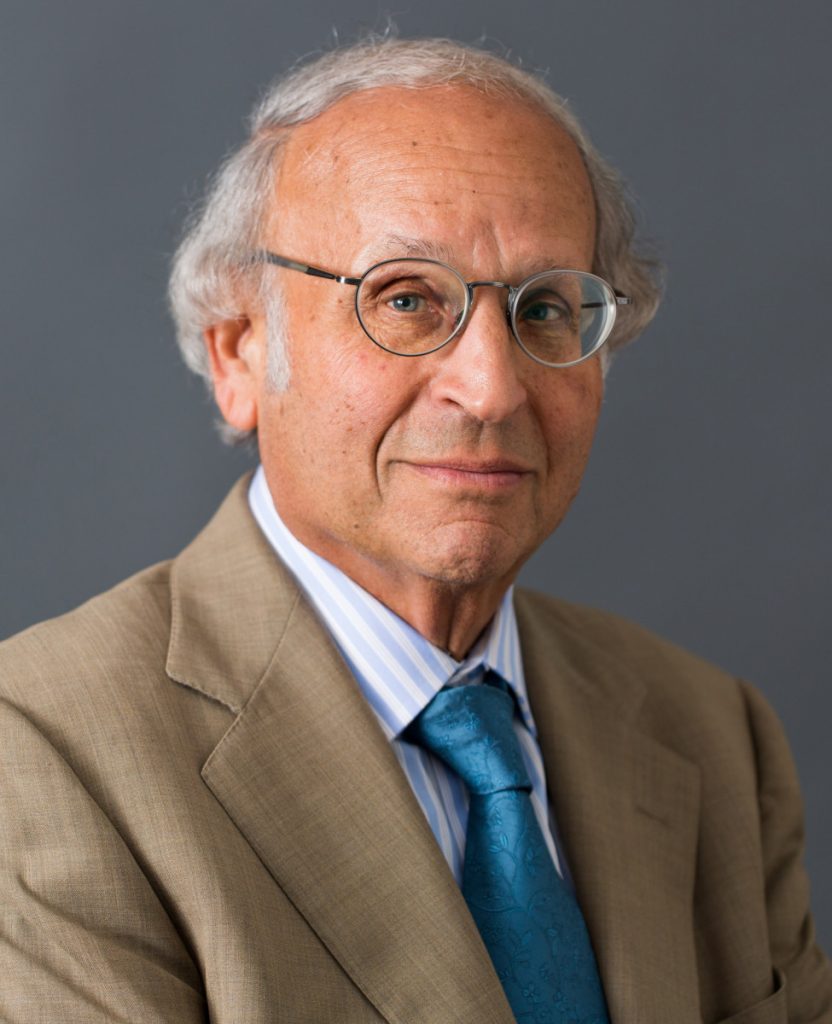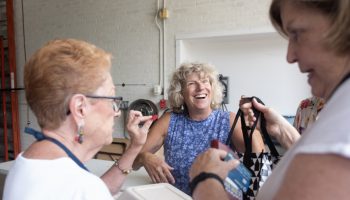
Deborah Trefts
Staff writer
Many Chautauquans wonder how dementia could affect their lives. Will a parent, sibling or friend suffer a significant decline in memory, reasoning or thinking skills? Will they themselves confront it?
Many others are all too familiar with dementia, as they have coped with or are currently trying to adjust to the stark reality of declining cognitive, functional and behavioral abilities in themselves or someone near and dear.
According to the Alzheimer’s Association, Alzheimer’s disease is both a cause of and a type of dementia. It “is a specific brain disease that accounts for 60–80% of dementia cases.”
Fortunately, Dr. Arthur S. Levine will be speaking at the Chautauqua Women’s Club’s Contemporary Issues Forum at 3 p.m. Saturday in the Hall of Philosophy. His lecture is titled, “The Biology of Alzheimer’s Disease and the Challenge of Treatment.”
At the University of Pittsburgh, from which Levine retired on July 1, he was a distinguished university professor; professor of medicine, molecular genetics and neurobiology; senior vice chancellor for the health sciences; John and Gertrude Petersen Dean Emeritus of the School of Medicine.
According to Levine, “Alzheimer’s disease affects millions and begins silently, two decades before symptoms arise.”
He will talk about “cutting-edge research on the biological roots of Alzheimer’s, the limitations of current treatments and the urgent shift toward prevention. With no cure, new approaches rely on early detection, innovative imaging and advanced animal models. (G)enetically engineered marmosets at the University of Pittsburgh offer a breakthrough path to test preventive therapies within realistic timelines, providing hope for those most at risk.”
While growing up in two of Cleveland’s eastern suburbs until he was 12 years old, Levine said he “was already interested in science, but at the time … didn’t think about becoming a doctor.” Then he “went to the Windsor Mountain School, headed by Gertrud and Max Bondy.”
Gertrud Bondy had studied under and been analyzed by Sigmund Freud. Her husband, Max, was an educator. In 1937, with their daughters and son, they left the schools they had co-founded in Germany and escaped from the Nazis, initially by moving to Switzerland. In 1939, they emigrated to the United States, where they co-founded a private, co-educational boarding school in the Berkshire Mountains of western Massachusetts.
According to “Rick Goeld’s Condensed WMS History,” “As headmistress, Gertrud was the school’s psychiatrist-psychologist-philosopher-in-residence, and moral and intellectual center. She led small discussion groups dealing with emotions, history, mental health, literature, politics and other subjects, and also did individual counseling.”
After graduating from Windsor, Levine enrolled in Columbia University, where he majored in comparative literature and edited The Columbia Review.
“I became interested in premed primarily because at that time in New York, psychoanalysis was a trend in Manhattan,” Levine said. “… I went to med school for psychoanalysis. When I called my father to say I wanted to drop out (to study) microbiology, my father said he would send me a bill (for my schooling starting from early childhood on) if I didn’t finish medical school.”
So, Levine enrolled in the Chicago Medical School of the Rosalind Franklin University of Medicine and Science in North Chicago, Illinois, graduating in 1964.
Since the University of Minnesota “is premier for med students who wanted to be scientists,” during the next three years he undertook his internship and residency in pediatrics, and a U.S. Public Health Service fellowship in hematology and biochemical genetics, at UM Hospitals in Minneapolis where, according to Levine, “there’s not much of a divide between pediatrics and adult medicine.”
“Then I went to the NIH (National Institutes of Health), which is divided by disease, not pediatrics and adults,” he continued. “I was particularly interested in oncology and tumor biology, so I (went to) the (National) Cancer Institute. I saw primarily patients with non-environmental cancer — leukemias, sarcomas, carcinomas.”
Within the Medicine Branch of the National Cancer Institute, Levine progressed from clinical associate to senior staff fellow to senior investigator from 1967 to 1973. In 1969, he became board certified in pediatrics. He served as head of the Section on Infectious Disease within the institute’s Pediatric Oncology Branch from 1973 to 1975.
Appointed chief of this branch in 1975, the following year he earned his American Board of Pediatrics certification in Pediatric Hematology-Oncology. He remained chief of the Pediatric Oncology Branch into 1982.
Levine “played a leading role in clinical research on childhood malignancies and … was one of the first to carry out systematic investigations on the prevention and treatment of opportunistic infections in patients with cancer.”
Then he moved on to the biology of embryos — embryogenesis — and worked for 16 years as the scientific director of the National Institute of Child Health and Human Development, one of the world’s top centers for developmental biology.
At the University of Pittsburgh in Pittsburgh, Pennsylvania, Levine held the positions of senior vice chancellor for the health sciences and the John and Gertrude Petersen Dean of the School of Medicine for a record of 22 years, from 1998 to 2020.
Instrumental in developing Pitt’s research trajectory, which according to Levine resulted in its being ranked fifth nationally in NIH research funding, he “focused on studies that exploit the vast amount of data emerging from the human genome project and on emerging and powerful technologies that enable us to visualize the three-dimensional structures, locations and interactions of the proteins encoded by genes as they exist at particular times in particular cells.”
Molecular biologic research has been one of Levine’s interests throughout his career. Collaborating with other investigators, he completed “the first physical and genetic mapping of SV40, a mammalian tumor virus.” He and his colleagues were “the first to work on naturally occurring viral recombinant DNAs, and the results provided an important source of information in the beginning of the recombinant DNA era.”
Concerned about “the precipitous decline across the nation in the numbers of young physicians and other health science students embarking upon substantive careers in research and education,” Levine introduced “new mechanisms designed to enhance the recruitment and retention of talented students and trainees.”
Working closely with the University of Pittsburgh Medical Center, he also sought “to ensure that health care delivery, biomedical research and education — the three legs of the ‘classic academic stool’ — remain equally strong and well-positioned for future growth.”
“I stepped down from my leadership position in 2020,” Levine said. “I’d become interested in Alzheimer’s, … and I wanted a new challenge. I physically moved my lab from Pitt Cancer to the Brain Institute building in Pittsburgh. I got the money for it, but I didn’t plan (to move into it).”
Levine then launched Pitt’s Assault on Alzheimer’s Program “to tackle one of the greatest biomedical and socioeconomic challenges we face today.” This lab “is focused on the molecular mechanisms that maintain the fidelity of the genome (and recently began) to explore this same theme in the brain.”




